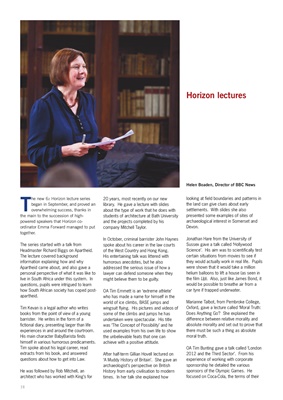
18
T
he new 62 Horizon lecture series
began in September, and proved an
overwhelming success, thanks in
the main to the succession of highpowered
speakers that Horizon coordinator
Emma Forward managed to put
together.
The series started with a talk from
Headmaster Richard Biggs on Apartheid.
The lecture covered background
information explaining how and why
Apartheid came about, and also gave a
personal perspective of what it was like to
live in South Africa under this system. In
questions, pupils were intrigued to learn
how South African society has coped postapartheid.
Tim Kevan is a legal author who writes
books from the point of view of a young
barrister. He writes in the form of a
fictional diary, presenting larger than life
experiences in and around the courtroom.
His main character BabyBarista finds
himself in various humorous predicaments.
Tim spoke about his legal career, read
extracts from his book, and answered
questions about how to get into Law.
He was followed by Rob Mitchell, an
architect who has worked with King's for
20 years, most recently on our new
library. He gave a lecture with slides
about the type of work that he does with
students of architecture at Bath University
and the projects completed by his
company Mitchell Taylor.
In October, criminal barrister John Haynes
spoke about his career in the law courts
of the West Country and Hong Kong.
His entertaining talk was littered with
humorous anecdotes, but he also
addressed the serious issue of how a
lawyer can defend someone when they
might believe them to be guilty.
OA Tim Emmett is an 'extreme athlete'
who has made a name for himself in the
world of ice climbs, BASE jumps and
wingsuit flying. His pictures and videos of
some of the climbs and jumps he has
undertaken were spectacular. His title
was 'The Concept of Possibility' and he
used examples from his own life to show
the unbelievable feats that one can
achieve with a positive attitude.
After half-term Gillian Hovell lectured on
'A Muddy History of Britain'. She gave an
archaeologist's perspective on British
History from early civilisation to modern
times. In her talk she explained how
looking at field boundaries and patterns in
the land can give clues about early
settlements. With slides she also
presented some examples of sites of
archaeological interest in Somerset and
Devon.
Jonathan Hare from the University of
Sussex gave a talk called 'Hollywood
Science'. His aim was to scientifically test
certain situations from movies to see if
they would actually work in real life. Pupils
were shown that it would take a million
helium balloons to lift a house (as seen in
the film Up). Also, just like James Bond, it
would be possible to breathe air from a
car tyre if trapped underwater.
Marianne Talbot, from Pembroke College,
Oxford, gave a lecture called 'Moral Truth:
Does Anything Go'? She explained the
difference between relative morality and
absolute morality and set out to prove that
there must be such a thing as absolute
moral truth.
OA Tim Bunting gave a talk called 'London
2012 and the Third Sector'. From his
experience of working with corporate
sponsorship he detailed the various
sponsors of the Olympic Games. He
focused on Coca-Cola, the terms of their
Horizon lectures
Helen Boaden, Director of BBC News